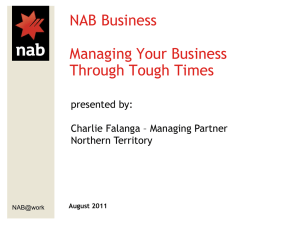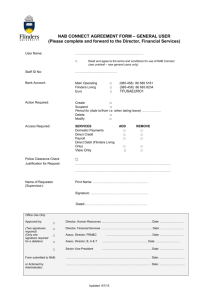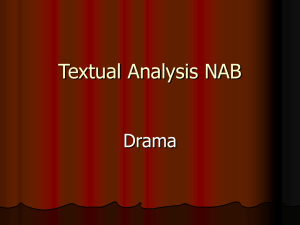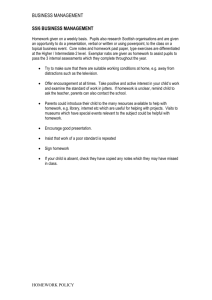Group Securities Trading Policy
advertisement
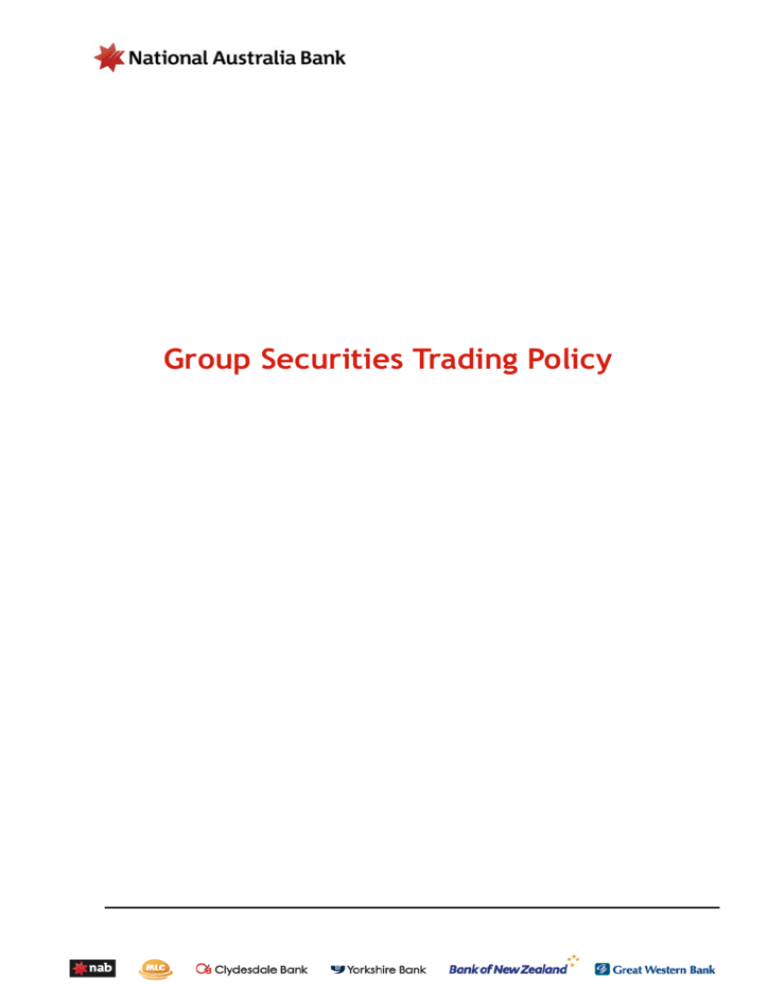
Group Securities Trading Policy Group Securities Trading Policy Page 3 of 13 Table of Contents Group Securities Trading Policy...................................................................................................................... 1 Group Securities Trading Policy...................................................................................................................... 4 1. Overview............................................................................................................................................. 4 2. Policy Statements............................................................................................................................... 4 3. Special Considerations....................................................................................................................... 9 4. Exemption Process ............................................................................................................................ 9 5. Schedules........................................................................................................................................... 9 6. Related Policies & References......................................................................................................... 10 Schedule 1 – Black-out Periods .................................................................................................................... 11 Black-out Period for NAB Directors and Designated NAB Employees ................................................ 11 Black-out Period for All Other NAB People .......................................................................................... 11 Schedule 2 - Terminology ............................................................................................................................. 12 Schedule 3 – Governance............................................................................................................................. 13 Functional Roles & Internal Allocation of Responsibilities ............................................................................ 13 Group Securities Trading Policy Page 4 of 13 Group Securities Trading Policy 1. Overview 1.1 Purpose and Objectives This document sets out the policy of National Australia Bank Limited (NAB) regarding NAB Group directors, officers, employees and secondees / contract-hires engaging in: (a) trading in NAB Securities; or (b) insider trading. The objective of this Policy is to ensure that NAB and its representatives not only comply with the law, but are beyond reproach in their dealings in the Securities and Inside Information of NAB and other entities with which NAB deals. This policy prohibits insider trading. 1.2 Application This Policy applies to each director, officer, employee and secondee/ contract-hire of the NAB Group. Throughout this document, the people covered by the Policy are referred to collectively as NAB People, or individually as a NAB Person. It also extends to the Immediate Family Members of NAB People, and to companies, trusts and entities controlled by them (see section 3). 1.3 Responsibility and Accountability Every NAB Person has an individual responsibility to ensure that they comply with the law relating to insider trading and this Policy. A breach of the law relating to insider trading can have serious consequences, including individual criminal and civil liability. A breach of this Policy will be treated by NAB as serious misconduct, and may lead to disciplinary action, including termination of employment with NAB. Guidance on the application of this Policy can be obtained from Corporate Legal, the General Counsel Corporate or the Company Secretary. 2. Policy Statements 2.1 Compliance with Law 2.1.1 General Prohibition against Insider Trading A NAB Person who possesses Inside Information in relation to the Securities of NAB or any other entity (including non-NAB Group entities) must not do any of the following things: (a) apply for, acquire or dispose of those Securities or agree to do so (Trade); (b) procure, encourage, incite or induce any other person to Trade (Procure a Trade); or (c) directly or indirectly communicate the Inside Information, or cause the Inside Information to be communicated to any other person who would be likely to Trade or Procure a Trade. A NAB Person cannot do any of these things either on their own behalf or on behalf of someone else. Group Securities Trading Policy Page 5 of 13 2.1.2 What is Inside Information? Inside Information is information that is: (a) (b) not Generally Available; and if it were Generally Available, a reasonable person would expect it to have a Material Effect on the price or value of the relevant Securities. Generally Available Information is Generally Available if: o it consists of readily observable matter; o it has been made known in a manner likely to bring the information to the attention of people who commonly invest in Securities of a kind whose price or value might be affected by the information, and, since it was made known, a reasonable period for it to be disseminated among such persons has elapsed (for example where the information has been brought to the attention of investors by an ASX announcement and a period of at least 24 hours has elapsed since that announcement); o it is derived from information which has been made public; or o it consists of observations, deductions, conclusions or inferences made or drawn from other Generally Available information. Material Effect Information is likely to have a Material Effect on the price or value of the relevant securities if the information would, or would be likely to, influence persons who commonly acquire Securities in deciding whether or not to acquire or dispose of Securities. Examples of information that might have a Material Effect on price or value include information relating to: o financial performance (including the reaching or failure to reach consensus or stated forecast earnings targets); o major acquisition or sale of assets; o actual or proposed takeover or merger; o actual or proposed change to capital structure; o entering into or terminating a material contract; or o a material claim or other unexpected liability. More examples of what information might be price sensitive, and therefore Inside Information are provided in the Guidance to NAB’s Disclosure Policy. Information about NAB or any other entity which is not Generally Available and might have a Material Effect on price or value is Inside Information. Not Limited to NAB Group Information Inside Information need not relate to the NAB Group. It could be information about a NAB Group customer, or one of its suppliers, or someone with whom NAB is discussing future strategic opportunities. Group Securities Trading Policy Page 6 of 13 2.2 Trading in Securities of other entities Inside Information is not limited to the NAB Group. The prohibited conduct under the Corporations Act includes Trading not only in Securities of the NAB Group but also those of other entities (including NAB’s customers, contractors or business partners) with whom the NAB Group may be dealing, where a NAB Person possesses Inside Information in relation to another entity. Some examples include: o another company with whom the NAB Group is dealing may provide Inside Information about itself or a third party; o information concerning the NAB Group or actions which may be taken by the NAB Group (for example, a planned transaction or strategic change) could have a Material Effect on the price or value of Securities in a third party company; or o where the employee is aware that the NAB Group is about to sign a major agreement with another company, the employee should not buy Securities in either the NAB or the other company. A NAB Person must not Trade Securities whilst in possession of Inside Information in respect of those Securities. 2.3 No Short-term Speculative Trading A NAB Person must not deal in NAB Securities for short-term gain. Speculating in short-term fluctuations in NAB’s Securities does not promote shareholder and market confidence in the integrity of NAB or NAB People. Any acquisition of NAB Securities triggers a 30 day period where that type of NAB Securities cannot be sold. This does not restrict the vesting or exercise of NAB Performance Rights or Performance Options and the sale of underlying NAB shares within the 30 day period. This also does not restrict the sale of NAB shares at the end of a restriction period. However, it does restrict the sale of the NAB shares during a 30 day period after NAB shares have been purchased. For details on the operation of restriction periods, performance hurdles, vesting and exercise requirements, refer to the terms of issue of the relevant NAB Securities. 2.4 Black-out Periods There are certain times during the year, given proximity to the release of NAB Group’s financial results, that no NAB Person should trade in NAB Securities. These periods, called Black-out Periods, differ depending upon the seniority and role of a NAB person within the organisation. Details of Black-out Periods are provided in Schedule 1. 2.4.1 Participation in Share Plans The Black-out Periods do not restrict participation in NAB share, performance option and performance rights plans but do apply in respect of any subsequent Trading of NAB Securities to which NAB People become entitled under those plans. Performance options and performance rights should only be exercised outside of the Black-out Periods. 2.4.2 Participation in Dividend Reinvestment Plan (DRP) Before any NAB Director or Designated NAB Employee elects to participate in the DRP or varies or withdraws their participation, they must first complete a Compliance Certificate. Group Securities Trading Policy Page 7 of 13 2.4.3 Directors’ Elections Directors should give a standing election with respect to the extent, if any, of their participation in NAB’s Share Purchase Plans. The election should only be given while a Director does not possess any NAB Inside Information. Directors should not vary any such election while in possession of NAB Inside Information. 2.5 Compliance Certificates Before any NAB Director or Designated NAB Employee Trades in NAB Securities, they must first complete a Compliance Certificate and submit it to their direct manager for acknowledgment and then to the Company Secretary or delegate. NAB Directors should provide the completed certificate to the Chairman of the Board or, in the case of the Chairman, to the Company Secretary. NAB Directors and Designated NAB Employees should also submit a Compliance Certificate if they are aware that an Immediate Family Member, or a trust or entity controlled by the NAB Director or a Designated NAB Employee, proposes to trade in NAB Securities. They should take all reasonable steps to prevent the trade occurring unless the Compliance Certificate has been acknowledged by NAB. The form of Compliance Certificate is available from the Forms Catalogue & Policy Central pages on our intranet, from the People Advisory Centre, from Computershare or from Group Governance. The Certificate is a confirmation from that person that he or she does not possess any Inside Information. Acknowledgment of the Certificate by NAB is intended as a compliance monitoring function only, and is not an endorsement of the proposed transaction: individuals remain responsible for their own investment decisions and their compliance with the law. NAB People are not required to complete Compliance Certificates for non-NAB Securities. If a Trade is to occur, the Trade must occur within 5 business days of NAB’s acknowledgement of the Certificate. 2.5.1 Disclosure of changes in Directors’ Notifiable Interests In addition to the compliance certification requirement set out under section 2.5 above, Directors and NAB have an obligation at law to notify the market of any Trading in relation to their Notifiable Interests in NAB. To enable NAB, as agent for the Director, to notify the ASX in accordance with ASX Listing Rule 3.19A, Directors must notify the Company Secretary immediately of sufficient details of any Trading in relation to their Notifiable Interests in NAB (e.g. upon the Director entering into an agreement to acquire NAB Securities). 2.6 Margin Loans Before any NAB Director or member of the Group Executive Committee: o enters into a loan arrangement whereby NAB Securities are mortgaged, provided as security, lent, or charged to a financier (Mortgage Loan); or o agrees to provide additional NAB Securities as security for an existing Mortgage Loan, they must first complete a Compliance Certificate and submit to: o if a member of Group Executive Committee, the Group Chief Executive Officer; o if the Group Chief Executive Officer, the Chairman of the Board; o if a Director, the Chairman of the Board; or o in the case of the Chairman, to the Company Secretary. Group Securities Trading Policy Page 8 of 13 In certain circumstances (set out in the Group Disclosure and External Communications Policy) NAB Directors and the Group Executive Committee are required to inform the Company Secretary where a financier demands payment under a Mortgage Loan and there is a risk that the demand will not be able to be satisfied without the disposal of NAB Securities. That information will be subject to the internal disclosure decision making process outlined in the Group Disclosure and External Communications Policy. 2.7 Derivatives and Hedging 2.7.1 No Derivatives over unvested NAB Securities NAB shares, performance options and performance rights are granted to NAB People as part of their remuneration. These grants are subject to the satisfaction of various time and/or performance hurdles to ensure alignment of employee rewards with NAB Group objectives and performance. The use of Derivatives over unvested NAB Securities could distort the proper functioning of these hurdles and reduce the intended alignment between management and shareholder interests. It is also against the law for members of Key Management Personnel to enter into Hedging Arrangements in relation to unvested elements of their remuneration. Accordingly, Derivatives are not permitted to be used in relation to any unvested NAB Securities. In addition, members of Key Management Personnel and their Closely Related Parties must not use Derivatives or otherwise enter into Hedging Arrangements in relation to elements of their remuneration that are unvested or which have vested but remain subject to forfeiture conditions. For the purposes of this Policy, NAB Securities are considered vested once the NAB-imposed time and performance hurdles have been satisfied, irrespective of whether a NAB Person has opted for a longer period of restriction in addition to the NAB-imposed time and/or performance hurdles. 2.7.2 Derivatives over vested NAB Securities If the NAB-imposed time and performance hurdles applicable to NAB Securities have been satisfied in accordance with the terms of the relevant employee plan, then the appropriate use of Derivatives can encourage longer term holding of NAB Securities by its people. Accordingly, once NAB Securities have vested (as described above), Derivatives may be used in relation to those vested securities in the following circumstances: o to protect the value of an asset supporting a loan taken out for the exercise price of options granted by NAB; o to protect the value of the Security where the employee has paid or is required to pay a tax liability at the tax cessation time; o on a case-by-case basis with approval from either the Chairman in relation to Directors or the Company Secretary in relation to the Chairman or the Group Chief Executive or his delegate in relation to executives and other staff members. Further, any use of Derivatives over vested NAB Securities must meet each of the following criteria: o the Derivative must have a maturity date that falls within the eight-week period that immediately follows the date on which either the half-year or full-year financial results are released to the ASX; and o neither the NAB nor any member of the NAB Group can be a counterparty to the Derivative. The use of Derivatives over vested Securities by NAB Directors and Designated NAB Employees, like any other Trading in NAB Securities, must comply with the law and with the Compliance Certificate process described in section 2.5 above. Group Securities Trading Policy Page 9 of 13 2.7.3 Disclosure NAB will publicly disclose all Derivative positions over NAB Securities taken out by a NAB Director. Disclosure will be made within any relevant prescribed period after the time of the Director entering the transaction, and in NAB’s Annual Financial Report following the transaction. NAB will also disclose publicly all Derivative positions over National Securities taken out by Key Management Personnel of NAB or the NAB Group. These disclosures will be made irrespective of whether or not the particular form of Derivative technically falls within the disclosure requirements of the ASX Listing Rules or the Corporations Act 2001 (Cth). 3. Special Considerations Immediate Family and Controlled Entities This Policy extends to the Immediate Family Members of NAB People, and to companies, trusts and entities controlled by NAB People. NAB People must take all reasonable steps to ensure that those people, companies, trusts and entities comply with this Policy. This includes taking all reasonable steps to ensure that they do not trade during the Black-out Period that applies to the NAB Person, and that they complete and submit Compliance Certificates if required for a dealing by the NAB Person. The requirement to submit a Compliance Certificate applies only to the spouse and dependent children of NAB Person (and not other Immediate Family Members), and to companies and trusts and entities controlled by NAB Person. 4. Exemption Process In Exceptional Circumstances, and subject always to compliance with the law, written exemptions from the operation of this Policy may be granted by: • Chairman of the Board of Directors of NAB; • Executive Director, Finance; • Group CEO or delegate; • General Counsel Corporate or delegate; or • Company Secretary or delegate. An exemption from the operation of this Policy is valid for 5 business days from the date it is given and is subject to both the NAB Person complying with section 2.5 of this Policy and the NAB Person’s individual responsibility to comply with the law. An exemption must be in writing and may be given via email. 5. Schedules Schedule 1 – Black-out Periods Schedule 2 - Terminology Schedule 3 – Governance - Functional Roles & Internal Allocation of Responsibilities Group Securities Trading Policy 6. Related Policies & References Group Securities Trading Policy Summary Securities Trading Compliance Certificate – Director Securities Trading Compliance Certificate – Designated NAB Employee Code(s) of Conduct Enterprise Behaviours Statement of Compliance Standards Group Conflicts of Interest Policy Group and Regional Policies on NAB Distributed Customer Investment Products Group Disclosure & External Communications Policy Page 10 of 13 Group Securities Trading Policy Page 11 of 13 Schedule 1 – Black-out Periods Black-out Period for NAB Directors and Designated NAB Employees For NAB Directors and Designated NAB Employees (see below), the bi-annual Black-out Periods are: • from 12.01a.m. AEDST on March 16 to 10.00a.m AEST on the ASX trading day after the day on which NAB’s half-year results are released to the ASX; and • from 12.01a.m. AEST on September 16 to 10.00a.m AEDST on the ASX trading day after the day on which NAB’s full-year results are released. NAB Directors, Designated NAB Employees their Immediate Family Members, and companies and trusts and entities controlled by those NAB People, must not Trade in NAB securities during these Black-out Periods. The Designated NAB Employees are: • Office of the Group Chief Executive Officer; • Group Exco Members and their direct reports; • Non-Executive Directors of Significant Subsidiaries; • Company Secretaries/General Counsel of Significant Subsidiaries; • Chief Audit Officer and direct reports; • EGM Human Capital Strategy and direct reports; • Members of the Disclosure Committee; • Members of Group Capital Committee; • all NAB People employed or engaged in external reporting within Group & Regional Finance & Enterprise Risk function; • all NAB people employed or engaged in capital, funding or balance sheet management within Group Treasury; • all NAB People employed or engaged in the following business units: • • Group Regulatory Affairs, Operational Risk & Compliance • Group Economics • Group Investor Relations • Group Communications • Group Development • Corporate Legal • Group Secretariat any other NAB Person or NAB People designated by the Company Secretary from time to time for the purposes of this Policy. It is the individual’s responsibility to confirm whether or not he or she is a Designated NAB Employee. In addition to these Black-out Periods, further restrictions apply to Trading in NAB Securities by NAB Directors, Designated NAB Employees and the spouse and dependent children of that NAB Person, and to companies and trusts and entities controlled by those NAB People. (see section 2.5). Black-out Period for All Other NAB People For all other NAB People, the bi-annual Black-out Periods are: • from 12.01a.m. AEST on March 31 to 10.00a.m AEST on the ASX trading day after the day on which NAB’s half-year results are released to the ASX; and • from 12.01a.m. AEDT on September 30 to 10.00a.m AEDT on the ASX trading day after the day on which NAB’s full-year results are released. NAB People, their Immediate Family Members, and companies and trusts and entities controlled by those NAB People, must not Trade in NAB Securities during these Black-out Periods. Group Securities Trading Policy Page 12 of 13 Schedule 2 - Terminology AEDT means Australian Eastern Daylight Time. AEST means Australian Eastern Standard Time. ASX means Australian Securities Exchange. Closely Related Party has the meaning given in section 9 of the Corporations Act 2001 (Cth). Derivatives has the meaning given in s761D of the Corporations Act 2001 (Cth) and includes options, forward contracts, futures, warrants, swaps, caps and collars. Designated NAB Employees has the meaning given in Schedule 1. Director means a director of National Australia Bank Limited. Exceptional Circumstances means: (a) severe financial hardship such as a pressing financial commitment that cannot be satisfied otherwise than by selling the relevant Securities; or (b) a court order, court enforceable undertaking, or other legal or regulatory requirement requiring a sale of Securities. Generally Available has the meaning given in section 2.1.2. Hedging Arrangement is an arrangement that would have the effect of limiting exposure to risk and includes, but is not limited to, arrangements referred to in Corporations Regulation 2D.7.01(1). Arrangements referred to in Corporations Regulation 2D.7.01(2) are excluded. Immediate Family Member means a family member of a NAB Person who may be expected to influence, or be influenced by, the NAB Person in his or her dealings with Securities. Immediate Family Member may include: (a) the NAB Person’s partner and children; (b) children of the NAB Person’s partner; and (c) dependants of the NAB Person or the NAB Person’s partner. Inside Information has the meaning given in section 2.1.2. Key Management Personnel has the meaning given in the applicable Australian Accounting Standards. Material Effect has the meaning given in section 2.1.2. NAB means National Australia Bank Limited. NAB Group means NAB and its controlled entities. NAB Person means each director, officer, employee and secondee / contract-hire of NAB or of a member of NAB Group and NAB People has a corresponding meaning. Notifiable Interest has the meaning given in rule 19.12 of the ASX Listing Rules (this definition is equivalent to section 205G(1) of the Corporations Act 2001 (cth)). Regional means in respect of a regional business unit of NAB Group from time to time (currently Australia, New Zealand (including United States of America and Asia), the United Kingdom) and includes Wholesale Banking. Securities include shares, options, rights, debentures, interests in a managed investment scheme, Derivatives and other financial products covered by s1042A of the Corporations Act 2001 (Cth). Significant Subsidiary means each of the following subsidiaries of NAB - National Wealth Management Holdings Limited, MLC Limited, National Australia Group Europe Limited, Bank of New Zealand and Great Western Bank. Trade has the meaning given in section 2.1.1(a). Group Securities Trading Policy Page 13 of 13 Schedule 3 – Governance Functional Roles & Internal Allocation of Responsibilities Function Roles & Internal Allocation of Responsibilities Business Units Ensure all NAB people are made aware of this Policy Develop appropriate controls to assure compliance Monitor compliance with this Policy Deliver appropriate training, education and communication Report and escalate any breaches or matters requiring disclosure Regional Operational Risk and Compliance Teams Perform an oversight function in terms of the second line of assurance Provide operational risk and compliance advice Follow up with business areas on actions taken to communicate awareness of this Policy Review regional insider trading policies to ensure alignment with the requirements of this Policy and applicable regional obligations Monitor and conduct a review of compliance with this Policy Report and escalate any breaches. Follow up and monitor progress of corrective actions and regulatory reporting obligations Analyse events to identify trends and systemic risks Consider changes to policy in line with changes in Regulatory requirements Group Governance Policy owner Policy development & specialist stakeholder engagement, including legal sign-off Communicate and disseminate this Policy for implementation across Corporate Centre and Regions Policy maintenance and update (minimum annual review) Principal Board Approval of Policy

